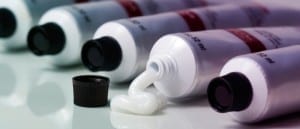Our Rheology Profiling for Topical pharmaceuticals including Creams, Ointments and Lotions provides a powerful toolkit of metrics for formulation,  process design and quality control personnel. The revealing insights delivered by measuring the rheology of semisolids can help greatly with:
process design and quality control personnel. The revealing insights delivered by measuring the rheology of semisolids can help greatly with:
- Comparing a generic formulation with the Reference Listed Drug
- Predicting spreadability, skin feel and sensory properties
- Adding meaningful, quantifiable metrics to lab, pilot and production batches for scale up
- Identifying the impact of temperature regimes, cooling rates and holding times on product texture
- Tracking viscosity/rheology build trajectories for batches following manufacture
- Gaining a sensitive, early insight into instability throughout ageing studies
- Identifying the impact of excipient changes
Get a quote for sample analysis
Viscosity testing vs rheology testing of pharmaceuticals
Viscosity testing of topical pharmaceuticals is often performed  with a Brookfield viscometer fitted with either standard RV or LV spindles or a Small Sample Adapter for “flowable” samples such as lotions or a T-Bar/Helipath accessory for soft solid samples such as creams and ointments. While this approach provides a low cost solution for quick comparative testing of batches there are some major attributes of pharma topical products that the viscometer cannot measure.
with a Brookfield viscometer fitted with either standard RV or LV spindles or a Small Sample Adapter for “flowable” samples such as lotions or a T-Bar/Helipath accessory for soft solid samples such as creams and ointments. While this approach provides a low cost solution for quick comparative testing of batches there are some major attributes of pharma topical products that the viscometer cannot measure.
Yield Stress
Yield stress is a measure of the stress that must be applied to elicit significant flow from a soft-solid sample such as a cream or ointment. As such, yield stress contributes significantly to the attributes such as the ability to squeeze a sample from a tube and the spreadability onto the skin. A sample with a high yield stress will resist squeezing and spreading.
High shear viscosity
Application onto the skin is a high shear process, with shear rates progressing to higher values as the fluid film thickness decreases with ongoing spreading. To gain a reliable understanding of the spreadability and ease of application viscosity profiles recorded at high shear are essential. These measurements are way outside of the range of typical viscometers.
Zero-shear viscosity
Zero-shear viscosity can be thought of as the viscosity of a formulation when effectively at-rest. As products spend most of their lifetimes in an at-rest condition they therefore spend this time at their zero-shear viscosity, not at the viscosity under the shear conditions imposed in a viscometer measurement. Zero-shear viscosity is a key contributor to suspension and emulsion stability (see this article) and has been proposed as a contributor to the diffusion of active ingredients into the skin.
Zero-shear viscosity necessitates the employment of high performance research rheometers, with ultra-low torque motor control and ultra-low friction air-bearings.
Thixotropy
The rate at which a material undergoes structural breakdown and shear thinning contributes to the ease with which it can be applied. Some topicals require “working” to shear them down during application whereas others shear-thin to a free flowing liquid with the slightest touch.
Recovery after shear determines how rapidly a material will return to a structured, high zero-shear viscosity condition and, as such, will influence behaviour over the period following application of creams and lotions.
Tribology
Throughout the application of a topical product the layer thickness is progressively decreasing and, as such, the rheological regime that exists where two surfaces are separated by a layer of liquid transitions to a tribological regime, where the skin surfaces come into direct contact with each other. At this stage the squeezing load force and the sliding speed contribute to the friction generated. The lubricating qualities of topical products can be investigated by measuring the frictional force of artificial elastomeric surfaces in sliding contact under defined loads and sliding speeds.
If you would like to learn about our Rheology Profiling for Topical pharmaceuticals capabilities please contact us to discuss your needs.
